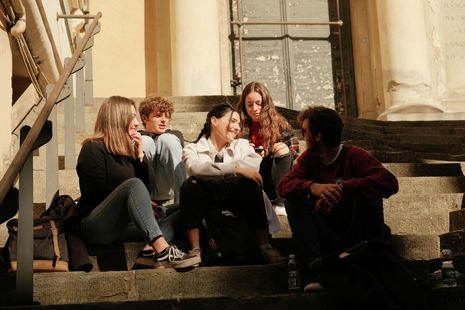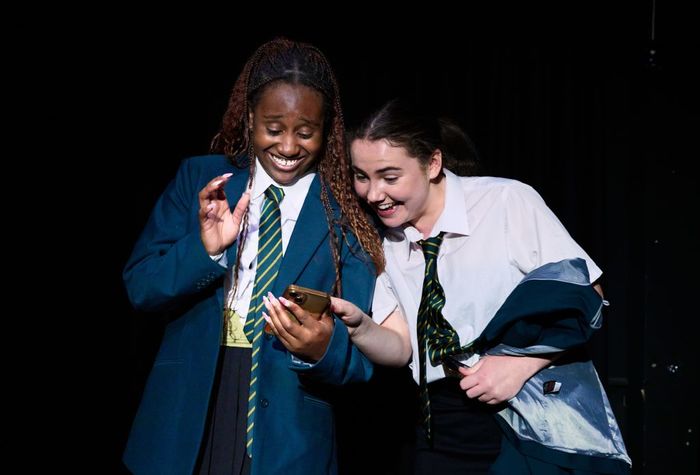The importance of the post-theatre debrief
Daphne Stavride makes the case for keeping the conversation going offstage

The infamous and almighty debrief. A cultural staple, the debrief’s main purpose lies in gathering friends together to recount and analyse the shared events of the night before. Far from a frivolous tradition, the debrief functions as a socially meaningful exercise, allowing participants to reflect on and assign value to collective experience. Although the debrief is most commonly linked to nights out, it is by no means confined to that. In fact, the theatre invites its own brand of similar, if not more deliberate, debriefing. Whether it’s debating a director’s choices, unpacking a bold performance, or simply trying to make sense of what unfolded on stage, the post-show debrief, I believe, forms a crucial part of how we engage with theatre. It is in these raw and reflective conversations that the real dialogue begins.
Instead of merely being an art form that relies on passive consumption, theatre actively invites interpretation and emotional response. The relevance of what unfolds on stage rarely remains confined to the physical space of the theatre, rather it often resonates beyond the performance itself, prompting ongoing reflection and, frequently, lively debate. My time at Cambridge has helped me to view theatre-going as a more inherently social activity. From leaving the theatre feeling comically disorientated after the 2023 Fresher’s Play Serious Money, to my college wife and I being left in awe of the talent on display in the striking Michaelmas 2024 production of The Crucible, I found that taking some time to unpack a performance with others not only allows one to absorb the theatrical experience more meaningfully, but also highlights that the dialogue that theatre sparks forges a kind of collective intimacy among spectators.
“The post-show debrief operates not simply as a social ritual, but as a continuation of the theatrical experience itself”
I found that whether you were moved, enthused, or frustrated by a performance, theatre creates one of the rare contemporary social contexts in which a group of strangers sit together in synchronised silence. It allows the post-show debrief to not only operate as a social ritual, but as a continuation of the theatrical experience itself, as well as a transformation of the shared silence into dialogue, deepening engagement and broadening its interpretive possibilities.
Beyond the usual topics of discussion – the quality of acting or technical aspects of production – sitting down with a friend after silently sharing a few hours in the auditorium has allowed me to explore a performance beyond its visual appeal. Nothing beats the post-show rush of wanting to unravel all the underlying threads of meaning woven by the company of performers and creative team alike. I recall experiencing this most intensely after going to see the Tony-award winning musical, A Strange Loop, a couple of years ago. A Strange Loop follows Usher, a Black queer writer writing a musical about a Black queer writer writing a musical, while grappling with his desires, identity, and instincts. While musicals are frequently dismissed as being simplistic or purely entertaining, I felt that A Strange Loop exemplified how the form can serve as a vehicle for nuance and socio-cultural critique through its thematic and creative boldness.
“Nothing beats the post-show rush of wanting to unravel all the underlying threads of meaning woven by the company of performers and creative team alike”
Leaving the theatre, I felt an overwhelming compulsion to dissect the ways in which this musical challenged conventions, particularly with its use of an energetic six person ensemble to embody both Usher’s inner thoughts on stage and important figures in his life. The musical’s centralisation of a single character’s journey, with the portrayal of all its highs and lows, was especially effective in drawing out its critique of the intersection of race and queerness with Broadway’s flawed normative frameworks. It created fertile ground for open discourse around the potential of the musical theatre genre to adapt to contemporary culture and defy its pre-established forms of representation. Theatre at its best should challenge audiences to contemplate elements of the political and socio-cultural climate – a dialogue which starts at the post-show debrief!
And you need not venture as far as the West End to experience theatre that both challenges and delights. The vibrancy of Cambridge’s theatre scene, with its high quality and remarkable breadth of shows staged, offers students and local theatre goers the opportunity to be both intellectually engaged and artistically inspired. Whether you prefer your debrief accompanied by a post-show pint or a scoop of Jack’s, I found that fruitfully absorbing a play with fellow theatre-goers can transform a single night of theatre into something more lasting and holistically fulfilling. Momentarily breaking away from the habit of passive consumption, to instead consider how a performance resonates with our own beliefs, experiences, or blind spots, is not only enriching, but essential. So next time you visit the theatre, don’t rush off after the curtain falls – let the play continue offstage, in conversation.
 News / Judge Business School advisor resigns over Epstein and Andrew links18 February 2026
News / Judge Business School advisor resigns over Epstein and Andrew links18 February 2026 News / Gov grants £36m to Cambridge supercomputer17 February 2026
News / Gov grants £36m to Cambridge supercomputer17 February 2026 News / Union speakers condemn ‘hateful’ Katie Hopkins speech14 February 2026
News / Union speakers condemn ‘hateful’ Katie Hopkins speech14 February 2026 News / CUCA members attend Reform rally in London20 February 2026
News / CUCA members attend Reform rally in London20 February 2026 News / Right-wing billionaire Peter Thiel gives ‘antichrist’ lecture in Cambridge6 February 2026
News / Right-wing billionaire Peter Thiel gives ‘antichrist’ lecture in Cambridge6 February 2026










